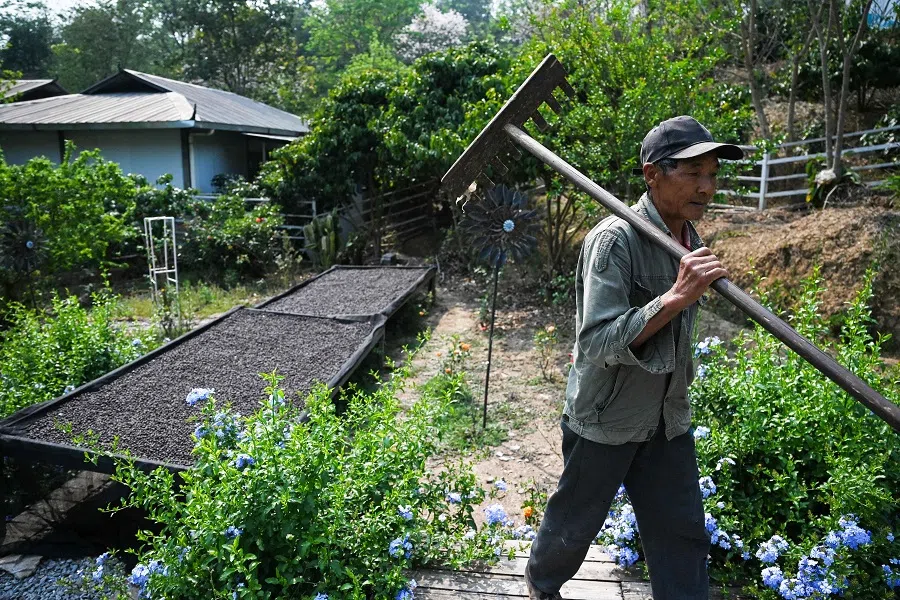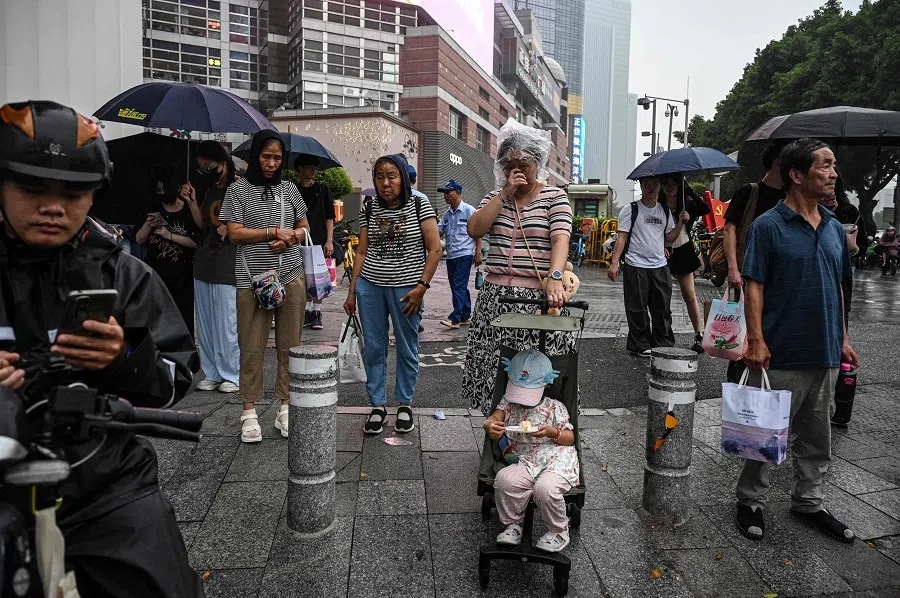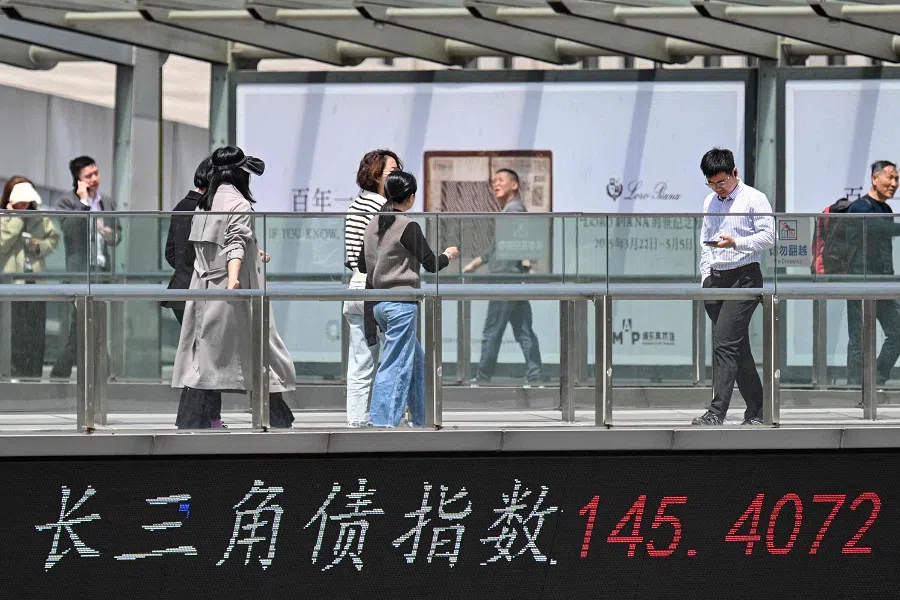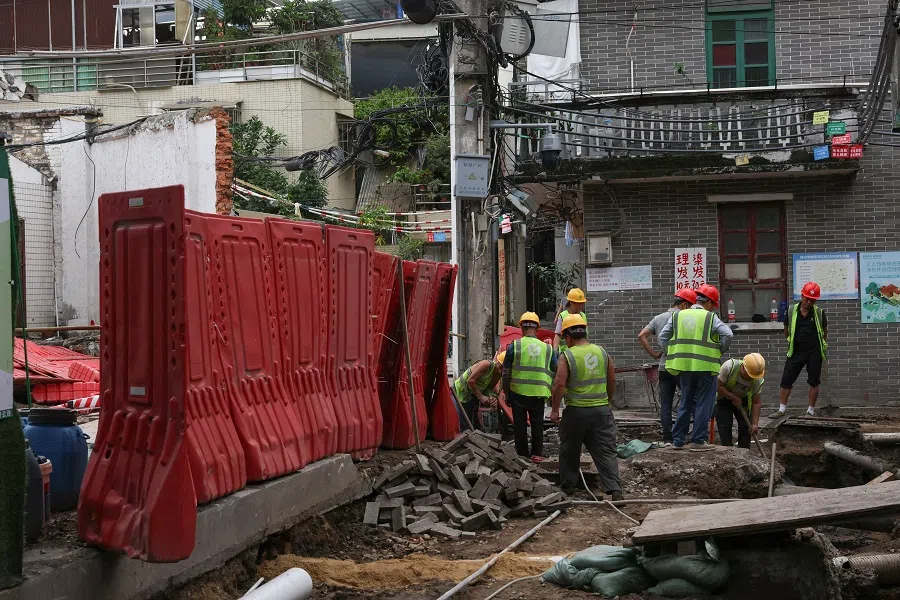Can pensions save China’s economy? The rural elderly at the heart of a trade war strategy
As China faces down US tariffs, one especially vulnerable group is rural farmers, whose pension may not be sufficient to tide them through. Lianhe Zaobao’s China Desk dives into the issue.

Following the outbreak of the China-US tariff war, China sees expanding domestic demand as an important countermeasure. Economists and members of the public have turned their attention to the rural elderly on the fringes of Chinese society, urging officials to significantly increase their meagre pension to allow this massive and impoverished population to have greater purchasing power.
Nomura’s chief China economist Lu Ting said on a Tencent Finance (腾讯财经) programme aired on 25 April that amid the escalating China-US trade war, China needs to further stimulate consumption to boost its economy. He suggested raising farmers’ pension payments to enhance the purchasing power of low- to middle-income groups, thereby expanding domestic demand.
Meagre ‘farmers’ pension’
Under China’s current pension system, 180 million elderly individuals receive the basic pension for urban and rural residents, with the majority being from rural areas. This is why the pension is often referred to as the “farmers’ pension”. Currently, the average monthly pension for these individuals is approximately 240 RMB (US$33), though this amount varies by province and city. Last year, Shanghai and Beijing offered higher pensions at 1,490 RMB and 961 RMB respectively, while Sichuan and Hunan remained below 200 RMB. Data released in 2023 showed that farmers’ pensions in most Chinese provinces ranged between 100 and 200 RMB at that time.
Meanwhile, retirees from the Chinese government and public institutions, as well as those from urban enterprises, enjoy different pension systems. According to the official China Labour Statistics Yearbook, the average monthly pension in 2022 for the two groups was 6,099.80 RMB and 3,148.60 RMB respectively.
Last year, Chinese media platform Yicai reported that the pension for farmers is dozens or even hundreds of times lower than the pensions of government employees and enterprise employees.
This situation forces them to rely on their children, the “second-generation migrant workers”, who in turn must cut back on their own consumption to support their parents and save for their own future needs. — Professor Ju Ronghua, College of Economics and Management, China Agricultural University

As China attempts to boost domestic demand to withstand external shocks, the inadequacy of pension payments for hundreds of millions of farmers, which are barely enough for subsistence, presents a significant challenge.
In March this year, Professor Ju Ronghua of the China Agricultural University’s College of Economics and Management cited data from the National Bureau of Statistics of China, stating that last year, the per capita consumption expenditure of rural residents in China was only 42% that of urban residents. She highlighted that the rural elderly are caught in a “consumption suppression trap” due to low pension levels, resulting in reduced medical spending and minimal service consumption. This situation forces them to rely on their children, the “second-generation migrant workers”, who in turn must cut back on their own consumption to support their parents and save for their own future needs.
She said, “This double pressure not only weakens current consumption momentum but may also create a vicious cycle of low security — low consumption — low development.”
How the government can help
Lu thinks that if farmers receiving a monthly pension payment of 200 RMB are able to receive an additional 200 RMB in subsidy, effectively doubling their income, “it would be a significant increase for them”. This would greatly enhance their willingness to spend, significantly driving consumption growth.
For the vast number of migrant workers in China, this measure could also ease their burden of supporting elderly family members and improve their expectations for future income, in turn stimulating their current consumption.
Lu thinks that promoting pension system reforms and enhancing social security levels will be the most effective policy tools for boosting consumption in China over the next year or two.
Raising farmers’ pensions can boost consumption and enhance the authorities’ legitimacy, social stability, and international image. — Peng Yuanwen, Chinese commentator

Prior to Lu’s remarks, several Chinese economists, government officials, and National People’s Congress representatives had already called for an increase in farmers’ pensions this year. This wave of public opinion began with former media professional Peng Yuanwen’s article “Ten reasons to raise farmers’ basic pension to 1,000 RMB”, published in January.
Peng, who previously held executive roles at prominent Chinese media platforms such as The Beijing News (《新京报》) and Vista (《看天下》), grew up in rural Sichuan. His personal and professional experiences have fuelled his long-term focus on those at the lower end of the social scale. He argues that raising farmers’ pensions can boost consumption and enhance the authorities’ legitimacy, social stability, and international image. Furthermore, it marks a crucial step for China in moving away from a “status-based hierarchical society.”
Over the past four months, Peng has been speaking out on various Chinese social media platforms, advocating that “raising farmers’ pensions is the best way to deal with the trade war”, which has been acknowledged and reposted by numerous Chinese academics and influencers.
Among the academics who reposted Peng’s opinion was Professor Qian Junhui of Shanghai Jiao Tong University’s Antai College of Economics and Management. On 8 April, Qian posted on his personal WeChat account, arguing that the existing “state subsidies” and consumption vouchers are insufficient to bridge the 3 trillion RMB gap in exports to the US. In light of the severe foreign trade situation, he thinks that the minimum standard for farmers’ pensions should be raised to 2,000 RMB.
A common counterargument is that farmers haven’t contributed enough to the pension system to justify substantial payouts.
Do China’s farmers deserve higher pensions?
However, given the stark pension inequalities, not all stakeholders are willing to redistribute resources. A common counterargument is that farmers haven’t contributed enough to the pension system to justify substantial payouts.
Some netizens fiercely rebutted Peng on Weibo: “Urban residents don’t automatically receive pensions; they must work and contribute to social security. Comparatively, rural residents, with land allocated at birth, are sometimes considered privileged.”

On the other hand, Ju thinks that after 1949, farmers supported China’s industrialisation process by paying agricultural taxes and providing low-priced grain. Yet they were never fully integrated into the modern social security system, resulting in an institutional historical debt. “Having the central government finance the pensions is essentially a way to settle this historical debt through intergenerational transfer payments,” she said.
Despite the continuous calls for significantly raising farmers’ pensions, the Chinese government has maintained a cautious approach.
Despite an increase of 16.3%, it has still sparked ridicule among netizens, who remarked, “There are many ways to insult a person,”; “You can’t even buy 500 grams of pork with this,” and “This is like giving alms to a beggar”.
20 RMB more: Is this China’s pension solution?
After the Chinese Communist Party’s “No. 1 central document” for 2025 explicitly called for the “gradual raising” of the farmers’ pension, the government work report delivered at the Two Sessions in March announced a 20 RMB increment to the minimum pension standard for farmers from the 2024 baseline of 123 RMB.
This is the seventh nationwide adjustment of China’s farmers’ pension since 2014. Despite an increase of 16.3%, it has still sparked ridicule among netizens, who remarked, “There are many ways to insult a person,”; “You can’t even buy 500 grams of pork with this,” and “This is like giving alms to a beggar”.
According to a March interview in The Economic Observer with Zheng Bingwen, director general of the Center for International Social Security Studies at the Chinese Academy of Social Sciences, approximately 90% of farmers’ pensions are funded by government transfers. Pension increases, therefore, rely almost entirely on the fiscal situation, requiring a pragmatic and fiscally responsible approach.

However, Peng countered Zheng’s argument by citing data on China’s fiscal expenditures. He pointed out that in 2023, the government allocated over 800 billion RMB in subsidies for 22 million retirees within the system, compared to just 368 billion RMB for nearly 200 million urban and rural residents, primarily farmers. This amounts to a per capita subsidy 17 times higher for the former group. Peng criticised Zheng for focusing on percentages rather than absolute figures, accusing him of distorting the facts and being “very misleading”.
Based on a 2,000 RMB monthly pension for each of the 130 million rural elderly, Qian calculated an annual cost of 3.12 trillion RMB. He dismissed this as insignificant for the central government and urged policymakers to “act decisively”, arguing that “an additional 3 trillion RMB in farmers’ pensions could drive a trillion-level increase in consumption”.
The plight of China’s rural residents
Chinese state media Farmers’ Daily (《农民日报》) stated in a 16 April article that the rural elderly cannot survive on a meagre 200 RMB pension and must therefore supplement their income with work. The article noted that these individuals have long been marginalised within the social security system, facing a pension dilemma of “contributing to the country when young, and relying on themselves when old.” It emphasised that they deserve more attention and support.
People’s Tribune, a magazine under People’s Daily, reported last October that the average age of Chinese migrant workers is increasing, with a growing proportion aged 50 and above. Furthermore, labour force participation among rural elderly aged 65 and above is also on the rise.
At the same time, incidents across China highlight the increasing difficulty older migrant workers face in finding work. Construction sites have reportedly dismissed workers over 60, and the domestic service industry has resisted hiring older individuals, limiting their livelihood options.
The report mentioned that the monthly farmers’ pension back then was only 55 RMB, but it gave many rural elderly some hope: “I won’t commit suicide for now; let me hold on for another year or two.”

The issue of rural elderly potentially committing suicide due to their dire circumstances has resurfaced. A 2014 report from China Youth Daily, now titled “Suicide among rural elderly is at a shocking level”, has been republished by various independent media accounts and widely shared on Chinese social media.
The report mentioned that the monthly farmers’ pension back then was only 55 RMB, but it gave many rural elderly some hope: “I won’t commit suicide for now; let me hold on for another year or two.”
Whether or not raising farmers’ pensions is part of China’s strategy for addressing the tariff war, bridging the significant gap between these pensions and those of urban residents and government employees is a challenge policymakers must eventually confront. This issue is particularly crucial for a nation that proclaims “equality and justice” as core values, as it directly relates to social equality and justice.
This article was first published in Lianhe Zaobao as “中国会大幅提高农民养老金应对美国关税战吗?”.



![[Video] George Yeo: America’s deep pain — and why China won’t colonise](https://cassette.sphdigital.com.sg/image/thinkchina/15083e45d96c12390bdea6af2daf19fd9fcd875aa44a0f92796f34e3dad561cc)
![[Big read] When the Arctic opens, what happens to Singapore?](https://cassette.sphdigital.com.sg/image/thinkchina/da65edebca34645c711c55e83e9877109b3c53847ebb1305573974651df1d13a)
